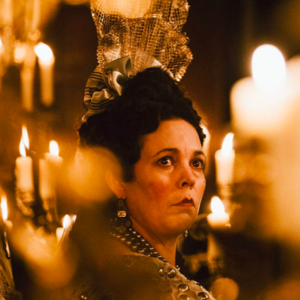“The Favourite,” which is poised to earn nominations for several Oscars on Tuesday, has been praised for critiquing the rich and powerful and those who curry their favor. Brad Gullickson describes it as “a deeply satisfying dark comedy of bottomfeeders.” It is also, as Esther Zuckerman observes, “about women’s caustic friendships and how they negotiate power.”
But, despite its cinematographically rich depiction of palace intrigue, the film is not an accurate portrait of Queen Anne or the political standoff between Whigs and Tories that brought down the Marlboroughs in 1710. The true story of Queen Anne’s court that year is not a story of an impulsive monarch whimsically adopting and dismissing court favorites, but a story about rising anti-European sentiment, insider political satire, a high-profile libel suit, and an impeachment trial that aroused populist mob protests.
The film’s director, Yorgos Lanthimos, may not have made as many revisions to history as Mel Gibson made in “Braveheart.” But facts still matter. The real history of Queen Anne’s reign has even more relevance to today’s world than the lesbian triangle Lanthimos renders so artistically.
“The Favourite” accurately captures the power struggle between Sarah, Duchess of Marlborough, and her cousin Abigail Masham, but it overplays the likelihood of lesbianism.
As Anne Somerset explains in “Queen Anne: The Politics of Passion,” Sarah felt that “lesbianism was a disgusting vice, with which she had never been tainted.”
The Duchess of Marlborough accused the queen of having a lesbian relationship with Abigail, but this was to shame the queen into dismissing Abigail, who was, as the film suggests, facilitating meetings between the queen and the Tory Member of Parliament Robert Harley, who wanted to end the War of Spanish Succession.
Harley was, like Sarah, a cousin of Abigail, not a brutish fop who coerced her into allegiance by pushing her into the mud. And Sarah was not concerned about losing Anne’s friendship for her own sake but for fear of losing influence she felt was essential to Britain winning the war against the autocratic, expansionist Catholic monarch Louis XIV of France. Having encouraged Anne to rebel against her own father, James II, in the Glorious Revolution of 1688, to prevent him from returning England to Catholicism, the Marlboroughs wanted to prevent the Catholic pretender to the British throne, living under the protection of Louis XIV, from making another attempt to claim power in Britain.
It is remarkable to see a film about the under-appreciated Queen Anne, rather than merely another film about the better-known and more physically attractive monarchs Elizabeth I or Mary Queen of Scots (although there is also one of those out this season for those viewers who cannot get enough of the Tudor era). It is disappointing, however, to see the careful and diligent Anne — punctilious for ceremony — reduced to sitting on the floor eating cake with pet rabbits (also a fiction), then vomiting. Yes, Anne suffered from gout, near-sightedness, obesity and the tragedy of 18 pregnancies that produced no surviving heir, but she was above all regal and diligent in her monarchical duties.
Queen Anne was slow to put her thoughts into words, but she was not stupid. She cooperated with William and Mary in the Glorious Revolution, preserving England’s Protestant national church. She led England to the union with Scotland in 1707, creating the modern nation of Great Britain. She oversaw the army’s increasing success against the French, helping change the balance of power between powerful wealthy Catholic France and the Protestant nations of Europe. Anne was a Tory who tried to run a government balanced between Whigs and Tories but was finally brow-beaten by Whigs at court, including the Duchess of Marlborough, who insisted on a Whig majority in her cabinet.
The Marlboroughs and the Whigs did lose their grip on power in 1710, but it was not because Abigail displaced Sarah as Anne’s lesbian lover (nor did Abigail poison her cousin). The Whigs fell from power because they continued to support an expensive foreign war that seemed increasingly to be fought for European, not British, interests. The war was also driving thousands of German-speaking Protestant refugees into Britain, raising the level of anti-immigrant sentiment. In other words, three centuries before the British voted for Brexit, they were already skeptical of their relationship with Europe.
The Whigs also made two other major tactical errors that year. They took a libel suit against a best-selling Tory satirist, Delarivier Manley, who had mocked prominent court Whigs, including the Marlboroughs — an arrest that went against the Whigs’ usual liberal tolerance for satire. At the same time, the Whigs pursued an impeachment case against a Tory clergyman in the Church of England, Henry Sacheverell, who had preached a sermon undermining Whig principles of the legality of resistance to authority. The impeachment, pursued for ideological more than criminal reasons, aroused populist mobs of protesters in support of the clergyman.
The libel suit was strategically dismissed just before the impeachment trial began, and Mrs. Manley soon brought out a sequel to her best-selling satire, further tarnishing the Whigs. While the Whigs won the impeachment trial against Sacheverell, they lost the battle of public opinion and were trounced in the Parliamentary elections in the autumn of 1710.
Had Lanthimos dug a little deeper into the historical events behind the palace intrigue at Queen Anne’s court, his dystopian cinematographic satire might had offered an even more nuanced reflection on our own era.

